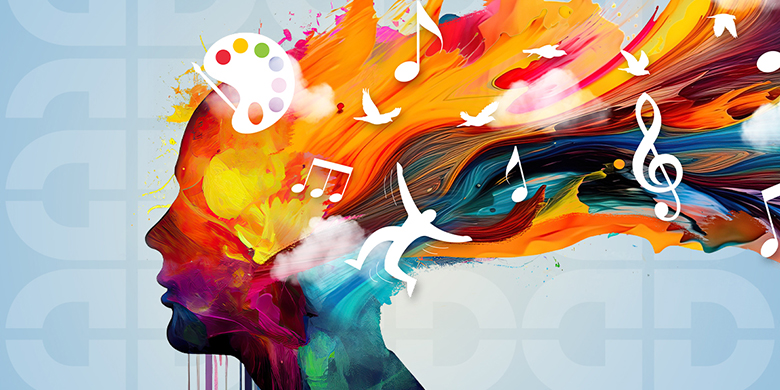On Friday, April 26, Dallas College students will have the opportunity to join Counseling and Psychological Services (CAPS) for an engaging, interactive day of learning at the Mental Health and Wellness Symposium.
This year’s theme, “Creative Modalities,” will dive into ways expressive art can support your mental health, with breakout sessions covering everything from dance, art therapy and music.
You don’t have to be an artist to benefit from creative outlets, CAPS Counselor Aubrey Webster said.
“The term ‘art’ can make people think, ‘Oh, I’m not an artist, I shouldn’t do this. I’m not good at drawing,’” Webster said. “It’s not just about painting or the fine arts. It’s any sort of creative outlet.”
Webster pointed out that even just 20 minutes of doodling has been shown to benefit mental health by decreasing cortisol levels.
During Webster’s breakout session, “Art As Therapy,” attendees will get the chance to practice hands-on art-making by creating and decorating their own boxes. “It takes no artistic ability, just a little time and focus.”
The purpose is to teach people how to build “a lasting relationship with yourself through art-making and to deepen your experience of life through being creative,” Webster said.
Using Art To Process
One Dallas College student has experienced firsthand the benefits of art on mental wellness. Jacqueline Christensen is completing her art prerequisite courses at Dallas College and has recently been accepted to Pennsylvania Western University to pursue a master’s in counseling with a concentration in art therapy.
She was inspired to pursue art therapy during her experience with postpartum depression after giving birth to her first son in 2020.
“At my lowest point when he was 6 months old, I reached out to a therapist for the first time in my life and began a transformative therapeutic process,” Christensen shared. “I processed a lot of my emotions through making art during that time alongside talk therapy.”
Christensen explains the benefits of art therapy and how it can help people process their feelings and emotions: “During the process of making art, you are focused and giving your present attention to the task at hand, which can create a sense of mindfulness and bring awareness to what you are thinking and feeling at that moment. Through this process, making art gives us better self-awareness, a method to self-regulate, and an outlet for stress relief. Just like I used art to process the feelings surrounding becoming a new mom in the middle of a global pandemic after a traumatic health event, creating art can help people find meaning and purpose in their experiences.”
Mental Health in College
Another Dallas College student looking forward to the Mental Health and Wellness Symposium is Hafsa Bujra, who is studying business management and administration at the Richland Campus.
Bujra believes college is an important time for students to focus on their mental health.
“A lot of time people don’t see how hard things can be when you’re in college. It can be tough trying to juggle school, work and even having fun, so it can take a big toll on someone.”
Bujra has experienced this juggling act firsthand. The oldest of four, Bujra attends class in the morning, works in the afternoon and still maintains a life outside of school and work.
“That’s where mental health comes in,” Bujra said. “I feel like people take mental health lightly. They don’t understand how it takes on energy and how it can affect an individual. I strongly believe in supporting mental health. I am looking forward to attending the symposium, hearing from experts on how to connect, how we can help in ensuring mental health is cared for, and how to encourage people to seek help.”
Webster believes the Mental Health and Wellness Symposium will be beneficial to students because, while you can easily find a lot of information and advice online about mental health, the symposium will present information directly from mental health professionals who have a foundation in creative work. And, it will teach skills to help students be more mindful of their mental health on a daily basis.
“That’s what’s so great about art therapy,” Webster said. “We’re all trying to find ways to manage stress and be calm and collected in life. The cool thing about art is we can feel our emotions through it, and you can have a safe place to process those feelings.”
Register to attend the 2024 Mental Health and Wellness Symposium
Friday, April 26
9 a.m.-3 p.m.
Richland Campus Performance Hall and Online
